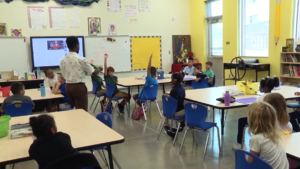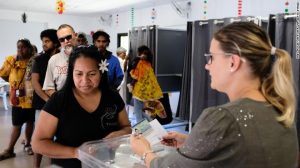Marcus Baskerville owns Weathered Souls Brewing Co. in San Antonio. He started the “Black Is Beautiful” beer initiative to raise funds for police brutality reform and legal defense organizations. His open-source stout recipe is available to any brewer willing to donate 100 percent of the proceeds from selling a “Black Is Beautiful” stout beer.
The craft brewery industry is not that inclusive and doesn’t have that many people of color. But being a Black man in the industry, I know it has the ability to be inclusive. Beer is a common denominator for conversation.
There’s a snob culture in beer for sure, but it’s more that people want great beer. From my own personal experience, if you communicate and start talking, then it makes a difference. People don’t know what a POC knows, and they may want to explain to you what an IPA is. I have to say, “I’m pretty sure I know more about beer than you.” That may deter you from wanting to engage in the conversation, but there have been white guys who’ve really supported me to learn and become an owner.
From what I’ve seen, I don’t think an actual consumer cares about the color of the skin of the person who’s making the beer—it’s more about the quality. Pre-COVID, an old veteran in his eighties would come in two to three times a week to our brewery. He knows me as the head brewer, and he comes in with his red MAGA hat and says, “Hi brother, how you doing?” He comes in and gives me a hug. He made my wife a Janet Jackson mix when we had this party at the brewery when she was pregnant. Remember, I’m in Texas, and the majority of my customer base is over-40 white Caucasian males. And we’re one of the most popular breweries in south Texas.
For the most part, I try to keep my political views out of beer, because “Black Is Beautiful” is not a political issue. This is a human issue that should have been corrected hundreds of years ago. I’ve tried to keep political views outside of the whole business, because you don’t want to alienate your customers. Someone’s political views don’t prevent them from being a decent person.

“Black Is Beautiful” is an open-source project where people can go to our website and grab everything they need. It’s important for every brewery to participate based off of the initiative that was set up.
I’m a huge stout fan. It’s my favorite style of beer. I was just going to release “Black Is Beautiful” as a stout in our taproom. But I credit Jeff Stuffings of Jester King Brewery in Austin, who convinced me to turn it into a large-scale thing.
We didn’t do any advertising—it’s all been word-of-mouth, social media, organic, everyone sharing posts, tagging your favorite brewery.
I thought we would get 200 or 250 breweries involved in the initiative, but now we have over 1,000 businesses in all 50 states, and across the world. The initiative has spread to Germany, Switzerland, Japan, China, Rwanda, Vietnam, Sweden, Canada, Australia, Brazil, and the Philippines. I only reached out to a total of, I think, eight or nine brewers who are close friends. Everything else has been organic sharing—people tagging their friends on social media. Hopefully I can get to taste some of the beer.

It’s been amazing. It’s definitely gone a lot further than I thought it would. There’s so much excitement and support for the initiative. Proceeds have been going to Black Girls Code, Black Lives Matter, NAACP, Know Your Rights Camp, and Campaign Zero.
We’re setting up these breweries to create dialogue and communication. The “Black Is Beautiful” initiative is creating a whole different ability for the breweries to communicate with a community they wouldn’t normally communicate with, and donate to a community they wouldn’t normally donate to. It shows these communities that breweries can be inclusive. It might bring a more diverse clientele through the door.
“Black Is Beautiful” is a grassroots thing. I want to see us getting into other industries and businesses. The ultimate goal is to raise awareness and get the message out. One of the points we’re asking breweries is what they’re planning to do for the long term. We want them to implement diversity initiatives in their structures, and work with their local communities.
When there are over 8,000 breweries in the United States, and less than one percent are minority-owned, it doesn’t entice Black people. In the 1970s and 1980s when the original craft breweries were planning and opening, it wasn’t very easy for people of color to get small business loans. That’s still going on. Look at the advertisement—at what point have you seen a commercial featuring a person of color advertising beer?
I’m in Texas where there are over 350 breweries, yet I’m the only Black brewery owner in the entire state. Why would other Black people want to invest money into a business that doesn’t have representation?

We’re dealing with the industry as a whole, and they’ve started to change. The Texas Brewers Guild voted unanimously to create a diversity committee, incorporating it later this year. I won’t be involved too much with that committee outside whatever direct help they need, because I’m going to be going for a board seat at the end of the year. That will allow me to help more with the processes that the Guild uses to make decisions.
Breweries are starting different foundations and internships to get more Black people involved. If you look, there are a few breweries across the country starting some mentorship programs and internships, like Brooklyn Brewery working with the Michael Jackson Foundation for Brewing and Distilling to offer scholarships for people of color in the brewery industry.
It’s been very important for me and my business partner to have a very diverse staff. And yet I could not find someone of color with experience to join the brew floor. At the bar staff level, yes, but the only people who applied for brewing positions were Caucasian males. I want to support POC bar staff to learn. Our production manager started off as bartender, and then midway through year one, he worked up to bar manager, then brewer assistant. We can replicate that system, but it’s rough for our employees right now.
Pre-COVID, we were doing very well as a brewery, so my bar staff was accustomed to a certain salary range. That’s been cut. We have a patio space, and depending on new rules set as far as opening goes, that’s how we’ll operate. We haven’t had to fire anybody, but as far as the money they’ve been making, tips have slowed down. And a survey by the Texas Craft Brewers Guild found that one out of three breweries in Texas could close by 2021, just based off of how COVID is going right now and the lack of revenue.
At the same time, organizations need more money than ever. We would obviously like to maintain the “Black Is Beautiful” initiative’s policy of 100 percent of proceeds going to organizations. We could get commercialized—we’ve had Walmart and other companies reach out—but we need to maintain the purity of proceeds and donations. You don’t want to become a movement where everything is monetized. You want to stay true to what the actual project is about.
I was visiting a distillery a week ago, and they didn’t know I was coming, and they were brewing “Black Is Beautiful” to release as a whiskey two years from now. A couple coffee companies want to create “Black Is Beautiful” coffee. Jägermeister partnered with us to donate funds. Yeti even sent drinkware products to check out what their involvement could be. The “Black Is Beautiful” initiative has the ability to cross over into different industries. It’s about how creative you want to be, and how you want to get involved.




